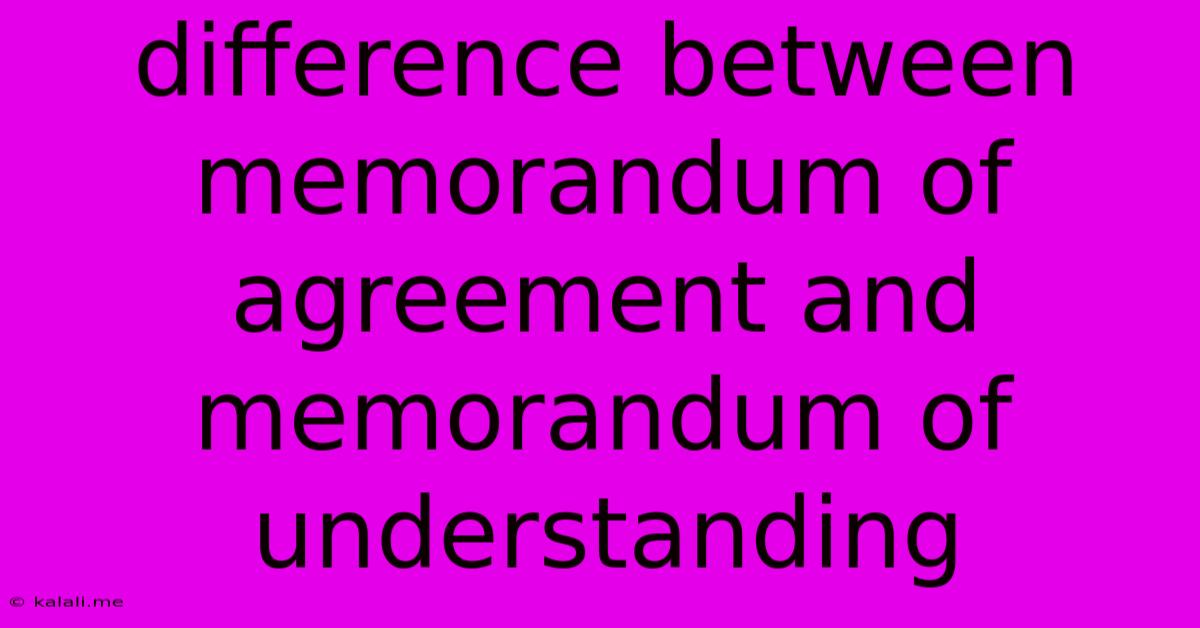Difference Between Memorandum Of Agreement And Memorandum Of Understanding
Kalali
Jun 15, 2025 · 3 min read

Table of Contents
Memorandum of Agreement vs. Memorandum of Understanding: What's the Difference?
Choosing between a Memorandum of Agreement (MOA) and a Memorandum of Understanding (MOU) can be confusing, even for seasoned business professionals. Both are crucial legal documents outlining the intentions of two or more parties, but their enforceability and level of detail differ significantly. This article will clarify the key distinctions between MOAs and MOUs, helping you determine which document best suits your needs. Understanding these differences is crucial for protecting your interests and ensuring a clear path forward in any business venture or collaboration.
What is a Memorandum of Understanding (MOU)?
A Memorandum of Understanding (MOU) is a non-binding agreement that outlines the common understanding of parties involved in a particular project or initiative. Think of it as a preliminary agreement that expresses the intention to cooperate. It details the shared goals, responsibilities, and expectations, but it doesn't usually specify the precise terms and conditions of a legally binding contract. While not legally enforceable, breaching an MOU can damage relationships and erode trust. Key features of an MOU include:
- Non-binding nature: An MOU doesn't create legally enforceable obligations. It's more of a statement of intent.
- General terms: It outlines broad goals and principles rather than specific, detailed clauses.
- Framework for future agreements: An MOU often serves as a foundation for future, more detailed, and legally binding contracts.
- Suitable for preliminary agreements: It's ideal for exploring potential collaborations before committing to a legally binding contract.
What is a Memorandum of Agreement (MOA)?
A Memorandum of Agreement (MOA) is a more formal and legally binding document than an MOU. It outlines a comprehensive agreement between two or more parties, including specific terms, conditions, and responsibilities. A breach of an MOA can lead to legal action. Key characteristics of an MOA include:
- Legally binding: An MOA is a legally enforceable contract, outlining specific commitments and responsibilities.
- Detailed terms and conditions: It provides a comprehensive outline of the agreement, including specifics on deliverables, timelines, and payment terms.
- Formal agreement: It often requires formal signatures and witnesses.
- Suitable for formal collaborations: It's ideal for situations requiring clear and legally enforceable obligations.
Key Differences Summarized:
| Feature | Memorandum of Understanding (MOU) | Memorandum of Agreement (MOA) |
|---|---|---|
| Legally Binding | No | Yes |
| Level of Detail | General, broad principles | Specific, detailed terms and conditions |
| Enforceability | Limited, relies on good faith | Fully enforceable in a court of law |
| Purpose | Expressing intent, preliminary agreement | Establishing a formal, legally binding agreement |
| Use Cases | Exploring potential collaborations, initial stages of a project | Formal partnerships, joint ventures, contracts |
When to Use Which Document:
- Use an MOU when: You're exploring a potential partnership, need to outline general principles, or are in the preliminary stages of a project. It's a useful tool for laying the groundwork for a more formal agreement.
- Use an MOA when: You're entering into a formal and legally binding agreement that requires specific terms and conditions, clearly defined responsibilities, and a mechanism for dispute resolution.
Conclusion:
Understanding the nuances between a Memorandum of Understanding and a Memorandum of Agreement is crucial for navigating the complexities of business collaborations. Choosing the right document ensures clarity, minimizes misunderstandings, and protects the interests of all parties involved. Always seek legal advice when drafting or reviewing these important documents to ensure they accurately reflect your intentions and provide adequate legal protection.
Latest Posts
Latest Posts
-
When Dissolved In Water Acid Produce
Jun 16, 2025
-
How Many Square Meters In A Mile
Jun 16, 2025
-
Which Of The Following Represents An Alpha Particle
Jun 16, 2025
-
The Planet With The Lowest Average Density Is
Jun 16, 2025
-
Number Of Valence Electrons In Cl Ion Are
Jun 16, 2025
Related Post
Thank you for visiting our website which covers about Difference Between Memorandum Of Agreement And Memorandum Of Understanding . We hope the information provided has been useful to you. Feel free to contact us if you have any questions or need further assistance. See you next time and don't miss to bookmark.